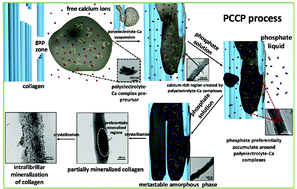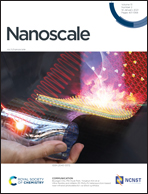Polyelectrolyte–calcium complexes as a pre-precursor induce biomimetic mineralization of collagen†
Abstract
Polyelectrolytes such as polyaspartic acid (PAsp) are critical in biomimetic mineralization as stabilizers of amorphous calcium phosphate (ACP) precursors and as nucleation inhibitors similar to non-collagenous proteins (NCPs). Nevertheless, the application of polyelectrolyte–calcium complexes as a pre-precursor, such as PAsp–Ca complexes, in the mineralization of collagen is unexplored. Herein, we propose a polyelectrolyte–Ca complex pre-precursor (PCCP) process for collagen mineralization. By combining three-dimensional (3D) STORM, potential measurements, and cryogenic transmission electron microscopy with molecular dynamics simulations, we show that liquid-like electropositive PAsp–Ca complexes along with free calcium ions infiltrate electronegative collagen fibrils. The PAsp–Ca complexes are immobilized within the fibrils via chelation and hydrogen bonds, and outward movement of free calcium ions is prevented while phosphate and hydroxide are recruited through electrostatic attractions. Afterwards, ACP instantly forms and gradually crystallizes. The PCCP process not only unites two distinct crystallization pathways (classical (free Ca/P ions) and non-classical (polyelectrolyte–Ca complexes)), but also provides a novel strategy for rapid biomimetic mineralization of collagen.



 Please wait while we load your content...
Please wait while we load your content...